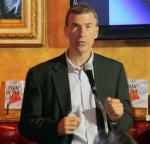Dr. Anthony Pratkanis, UC Santa Cruz psychology professor and social psychology researcher, held hundreds of students, employees, and community members in rapt Anthony Pratkanis attention last Friday at Ohlone College in Fremont, CA. Entitled “Selling FlimFlam,” Pratkanis' talk began with a loud admonition to “leave your conscience at the door.” It then delivered a powerful 1½ hour lesson that masqueraded as a guide to selling flimflam, but which was actually designed to teach us the signs that we’re being conned, duped, sold a bill of goods, and presented with empty promises.
Pratkanis' talk began with background information that showed how widespread and costly flimflam can be. In the U.S., more money is spent on medical quackery than on hospitalization. Con criminals rake in over $100 billion each year, promising everything from free food, to sex,
Anthony Pratkanis attention last Friday at Ohlone College in Fremont, CA. Entitled “Selling FlimFlam,” Pratkanis' talk began with a loud admonition to “leave your conscience at the door.” It then delivered a powerful 1½ hour lesson that masqueraded as a guide to selling flimflam, but which was actually designed to teach us the signs that we’re being conned, duped, sold a bill of goods, and presented with empty promises.
Pratkanis' talk began with background information that showed how widespread and costly flimflam can be. In the U.S., more money is spent on medical quackery than on hospitalization. Con criminals rake in over $100 billion each year, promising everything from free food, to sex,
 Anthony Pratkanis attention last Friday at Ohlone College in Fremont, CA. Entitled “Selling FlimFlam,” Pratkanis' talk began with a loud admonition to “leave your conscience at the door.” It then delivered a powerful 1½ hour lesson that masqueraded as a guide to selling flimflam, but which was actually designed to teach us the signs that we’re being conned, duped, sold a bill of goods, and presented with empty promises.
Pratkanis' talk began with background information that showed how widespread and costly flimflam can be. In the U.S., more money is spent on medical quackery than on hospitalization. Con criminals rake in over $100 billion each year, promising everything from free food, to sex,
Anthony Pratkanis attention last Friday at Ohlone College in Fremont, CA. Entitled “Selling FlimFlam,” Pratkanis' talk began with a loud admonition to “leave your conscience at the door.” It then delivered a powerful 1½ hour lesson that masqueraded as a guide to selling flimflam, but which was actually designed to teach us the signs that we’re being conned, duped, sold a bill of goods, and presented with empty promises.
Pratkanis' talk began with background information that showed how widespread and costly flimflam can be. In the U.S., more money is spent on medical quackery than on hospitalization. Con criminals rake in over $100 billion each year, promising everything from free food, to sex,
As our family story goes, when my parents left eastern Oklahoma for California (the first in their  Don Protherofamilies to move that far away in generations), many of their relatives bid them farewell with a sense of foreboding, quite certain that they would someday soon perish in a terrible earthquake. This may seem odd coming from people who dealt regularly with tornadoes, but it’s an opinion that persists to this day in many parts of the country, and demonstrates a sentiment which is returned with alacrity by people who can’t imagine living with the seemingly constant threat of deadly twisters known all too well by Oklahomans.
Last night’s talk by Dr. Don Prothero, professor of Physical and Historical Geology, Sedimentary Geology, and Paleontology at Occidental College, brought this family lore back to me. His talk, entitled “Catastrophes” and given at Café Valparaiso in Berkeley, assured me that my relatives were not alone in their tendency to oversimplify their threat evaluation of natural disasters. Prothero provided many detailed examples of death and destruction caused by a wide variety of na
Don Protherofamilies to move that far away in generations), many of their relatives bid them farewell with a sense of foreboding, quite certain that they would someday soon perish in a terrible earthquake. This may seem odd coming from people who dealt regularly with tornadoes, but it’s an opinion that persists to this day in many parts of the country, and demonstrates a sentiment which is returned with alacrity by people who can’t imagine living with the seemingly constant threat of deadly twisters known all too well by Oklahomans.
Last night’s talk by Dr. Don Prothero, professor of Physical and Historical Geology, Sedimentary Geology, and Paleontology at Occidental College, brought this family lore back to me. His talk, entitled “Catastrophes” and given at Café Valparaiso in Berkeley, assured me that my relatives were not alone in their tendency to oversimplify their threat evaluation of natural disasters. Prothero provided many detailed examples of death and destruction caused by a wide variety of na
 Don Protherofamilies to move that far away in generations), many of their relatives bid them farewell with a sense of foreboding, quite certain that they would someday soon perish in a terrible earthquake. This may seem odd coming from people who dealt regularly with tornadoes, but it’s an opinion that persists to this day in many parts of the country, and demonstrates a sentiment which is returned with alacrity by people who can’t imagine living with the seemingly constant threat of deadly twisters known all too well by Oklahomans.
Last night’s talk by Dr. Don Prothero, professor of Physical and Historical Geology, Sedimentary Geology, and Paleontology at Occidental College, brought this family lore back to me. His talk, entitled “Catastrophes” and given at Café Valparaiso in Berkeley, assured me that my relatives were not alone in their tendency to oversimplify their threat evaluation of natural disasters. Prothero provided many detailed examples of death and destruction caused by a wide variety of na
Don Protherofamilies to move that far away in generations), many of their relatives bid them farewell with a sense of foreboding, quite certain that they would someday soon perish in a terrible earthquake. This may seem odd coming from people who dealt regularly with tornadoes, but it’s an opinion that persists to this day in many parts of the country, and demonstrates a sentiment which is returned with alacrity by people who can’t imagine living with the seemingly constant threat of deadly twisters known all too well by Oklahomans.
Last night’s talk by Dr. Don Prothero, professor of Physical and Historical Geology, Sedimentary Geology, and Paleontology at Occidental College, brought this family lore back to me. His talk, entitled “Catastrophes” and given at Café Valparaiso in Berkeley, assured me that my relatives were not alone in their tendency to oversimplify their threat evaluation of natural disasters. Prothero provided many detailed examples of death and destruction caused by a wide variety of na
The Right Questions in Critical Thinking
Submitted by
Sheldon Helms
 Chris DiCarlo: photo by Jay Diamond
San Francisco-based skeptic group Reason4Reason (www.Reason4Reason.org) hosted a talk on August 13th by Dr. Christopher DiCarlo, promoted with the not-so-subtle moniker "How to Become a Really Good Pain in the Ass," the title of DiCarlo's latest book.
The talk was attended by several dozen eager skeptic-minded folks. Looking around the room, I couldn't help but ask myself, "Are these people all here because they want to be a pain in the ass?" Although I doubt that was the case, it wouldn't have mattered. The content of Dr. DiCarlo's talk was better described by his book's subtitle, "A Critical Thinker's Guide to Asking the Right Questions." In both the talk and the book, DiCarlo covered such topics as how to formulate strong, logical arguments (and how to recognize when they are flawed), a brief history of Socrates and his brilliant method of examining reality, as well as the definitions and importance of answering "The Big Five" questions (What can I know? Why
Chris DiCarlo: photo by Jay Diamond
San Francisco-based skeptic group Reason4Reason (www.Reason4Reason.org) hosted a talk on August 13th by Dr. Christopher DiCarlo, promoted with the not-so-subtle moniker "How to Become a Really Good Pain in the Ass," the title of DiCarlo's latest book.
The talk was attended by several dozen eager skeptic-minded folks. Looking around the room, I couldn't help but ask myself, "Are these people all here because they want to be a pain in the ass?" Although I doubt that was the case, it wouldn't have mattered. The content of Dr. DiCarlo's talk was better described by his book's subtitle, "A Critical Thinker's Guide to Asking the Right Questions." In both the talk and the book, DiCarlo covered such topics as how to formulate strong, logical arguments (and how to recognize when they are flawed), a brief history of Socrates and his brilliant method of examining reality, as well as the definitions and importance of answering "The Big Five" questions (What can I know? Why
